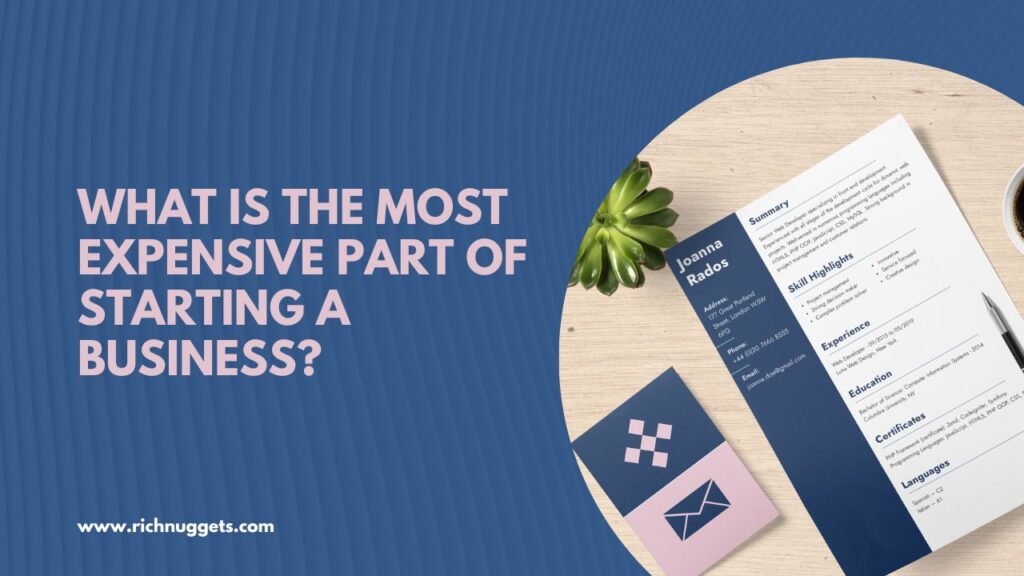You’ve got an exceptionally brilliant business idea to start your own business and you’re ready to go all in into the exciting world of entrepreneurship.
But there’s one pressing question: How much does it Cost to Start a Business?
Whether your aspirations involve conquering the online market, launching an innovative tech startup, or establishing a physical store, it is vital to comprehend the financial intricacies that will contribute to your business’s success.
Every aspect, from obtaining licenses and acquiring equipment to marketing your brand and compensating your exceptional team, requires careful consideration.
Within this blog post, we will dissect the expenses associated with commencing a business, ensuring you understand the investments required to transform your aspirations into tangible profits. Let’s commence this journey with enthusiasm!
Table of Contents
How much does it Cost to Start a Business?

As earlier said, when it comes to starting a business, one burning question lingers in the minds of aspiring entrepreneurs: how much does it cost to start a Business? While there is no one-size-fits-all answer, understanding the average costs associated with startups can provide valuable insights.
Typically, the average cost of starting a business ranges from $10,000 to $40,000 and it is mostly spent in the first full year of the business. Nevertheless, it’s crucial to understand that it is possible to start a business without money or even with millions of US dollars. The specific demands vary based on various factors, including the business’s nature, whether it operates online or has a physical presence and the scale of its operations.
For instance, an online business like dropshipping that doesn’t rely on inventory can be started with as little as $100 which will be spent only on the website development.
On the other hand, a brick-and-mortar business can incur significant costs for securing a location, expenses on furniture and fittings, and purchasing of inventory.
It’s essential to thoroughly calculate the startup costs for your desired business. Once you have a clear estimate, you can explore funding avenues (loan inclusive).
These forms of financing can help cover the costs incurred before generating revenue, giving your business a solid foundation to thrive upon. Therefore, it’s advisable to start saving early in preparation for launching your business.
As it has been researched that most new entrepreneur capital comes from 56% of their personal savings, 23% from friends and family, and 21% from loans.
By understanding the financial landscape of starting a business and being proactive in securing funding, you can set yourself up for success.
In the following sections, we will explore the various aspects that contribute to startup costs, shedding light on potential expenses and providing guidance to help you plan and allocate resources effectively.
What are the Four Costs of Business?

The four costs of business, commonly known as the four types of costs, are:
Fixed Costs:
Fixed costs are expenses that remain constant regardless of the level of production or sales. These costs do not fluctuate with changes in business activity. Examples of fixed costs include rent, salaries of permanent employees, insurance premiums, property taxes, and annual subscription fees.
Variable Costs:
Variable costs are directly related to the level of production or sales. They change proportionally as the volume of business activity changes. Examples of variable costs include raw materials, direct labor costs, production supplies, packaging materials, and sales commissions.
Semi-Variable Costs:
Semi-variable costs, also known as mixed costs, include elements of both fixed and variable costs. These costs have a fixed portion that remains constant and a variable portion that changes based on business activity. Examples of semi-variable costs include utility bills (with a fixed base charge and variable usage charges) and telephone expenses (with a fixed monthly fee and variable call charges).
Total Costs:
Total costs represent the sum of fixed costs and variable costs incurred by a business. It is the overall expense required to produce or deliver goods or services. Total costs are an important measure for calculating profitability and determining pricing strategies.
Understanding and effectively managing these different types of costs is crucial for business owners.
Breaking Down Startup Costs: Startup Cost Structure

When considering starting a business, knowing the startup cost structure will help you understand how to efficiently utilize your capital.
In this section, we shall be looking at the startup cost structure in two categories such as; Capital expenses and Operational expenses.
Capital Expenses:
Capital Expenses also known as capital expenditures (CapEx), are the significant investment expenses required to launch your business. They involve acquiring long-term assets that will yield future benefits. Here are a few examples:
1. Property or Real Estate: It covers buying or leasing office space, retail locations, or manufacturing facilities.
2. Equipment and Machinery: To drive your operations, you’ll need various tools and gadgets such as machinery, vehicles, or specialized equipment.
3. Technology Infrastructure: Investing in servers, computers, networking gear, and software systems will ensure smooth business operations.
4. Furniture and Fixtures: Furnish your workspace with office furniture, cubicles, shelves, lighting, and other essentials to create a comfortable environment.
5. Renovations and Improvements: If necessary, allocate funds for renovating the space to align it with your business needs and enhance efficiency.
6. Research and Development (R&D): Got some cool ideas you wanna bring to life? Allocate some funds for R&D projects to develop new products, tech, or processes.
7. Intellectual Property: Costs associated with obtaining patents, trademarks, copyrights, or licenses to protect the startup’s intellectual property assets.
8. Vehicles: If your business requires transportation, factor in the cost of purchasing company vehicles.
9. Initial Inventory: For businesses selling physical products, it’s crucial to have an initial stock of inventory to fill your shelves or warehouses.
10. Software Development: Custom software applications or platforms can be a game-changer, so allocate funds for development or customization.
Operational Expenses:
Operational expenses, also known as operating expenses (OpEx), are commonly regarded as the ongoing costs incurred by a company to support its day-to-day operations.
These expenses are necessary for running the business and maintaining its functionality. It’s important to allocate funds for these expenses during the startup phase and here are the common operating expense;
1. Employee Salaries and Benefits: Very important if you want the team to remain dedicated and motivated.
2. Rent and Utilities: Account for the cost of renting a workspace and paying bills for electricity, water, heating, and internet services.
3. Marketing and Advertising: Publicity is not up for debate, it can be done via the following channels; social media campaigns, content creation, graphic design, and public relations efforts.
4. Office Supplies: As little as paper, pens, folders, and other items necessary for day-to-day operations your business can’t do without them.
5. Professional Services: Occasionally, you may require the expertise of professionals such as accountants, lawyers, consultants, or contractors, so be prepared to cover their fees.
6. Travel and Entertainment: If your business involves travel or hosting clients, budget for expenses related to transportation, accommodations, meals, and entertainment.
7. Insurance: Protect your business from unforeseen events by including premiums for liability insurance, property insurance, and other necessary coverage.
8. Maintenance and Repairs: Plan for expenses associated with repairing equipment, machinery, vehicles, and the physical space in which you operate.
9. Software and Subscriptions: Expenses for software licenses, subscriptions to online tools or services, cloud storage, project management software, or customer relationship management (CRM) systems.
10. Training and Development: Invest in your team’s growth by setting aside funds for training programs, workshops, conferences, or online courses.
By understanding the breakdown of these startup costs, you can better plan your financial resources and allocate funds accordingly. Properly accounting for these expenses ensures a smoother launch and a solid foundation for your business to thrive.
What is a cheap way to start a business?

Starting a business using $10,000 to $40,000 can be very expensive to an average person, but there is a cheap way to start a business with little money that won’t put you in debt or make you spend beyond your tight budget.
Here are some cost-effective ways to start a business.:
Service-based business:
By utilizing this approach, you can explore the possibility of providing a service that demands minimal initial investment.
For instance, you can offer consulting, tutoring, freelance writing, graphic design, social media management, or website development. These particular types of enterprises typically necessitate only a computer, internet access, and your own skills and expertise.
Online business:
The Internet provides numerous opportunities for low-cost businesses. You could start an online store using platforms like Shopify or Etsy to sell products you create or source from suppliers. Or, you could offer digital products such as e-books, online courses, or stock photos.
Dropshipping:
With the Dropshipping business, you can sell products without holding inventory. Meaning, when a customer places an order, the product is shipped directly from the supplier to the customer without your involvement. This eliminates the need for upfront inventory investment and warehousing costs.
Reselling:
An alternative choice is to purchase products at a reduced cost and resell them to generate a profit. You can source products from thrift stores, garage sales, clearance sales, or wholesalers.
Platforms like eBay, Amazon, or Facebook Marketplace can serve as marketplaces for your reselling business.
Home-based business:
Operating your business from home can save on costs associated with renting or leasing commercial space.
This is particularly suitable for businesses that don’t require a physical storefront, such as consulting, e-commerce, or online services.
Collaboration and partnerships:
Consider partnering with other businesses or individuals to share costs and resources. For instance, you could share office space, equipment, or marketing efforts with complementary businesses. Collaboration allows you to leverage existing resources while reducing individual expenses.
Bootstrap and lean operations:
Start small and focus on generating revenue before scaling up. Minimize unnecessary expenses and avoid unnecessary hires or purchases. Reinvest profits into growing the business gradually.
Utilize free or low-cost marketing:
Take advantage of social media platforms, email marketing, content marketing, and search engine optimization (SEO) to promote your business without significant advertising costs. Engage with your target audience and build an online presence organically.
Starting a business demands dedication, perseverance, and ingenuity. Although these suggestions can assist you in minimizing expenses, it is crucial to thoroughly investigate and strategize your business to enhance the likelihood of achieving success.
What is needed to start a business?

In starting a business, there are things that are needed apart from the cost of starting the business, such as;
- Ideation
- Develop a Business Plan
- Develop a Business Model
- Choose Your Business Name
- Choose a Business Structure
- Get Your Business Licenses and Permits
- Business Funds
- Get a Location or Go Online
- Get Business Insurance
- Build your team
- Marketing Your Business Effectively
If you want more details on each, you can check our article on how to start a business
How much money should you save before starting a business?

Another question startup entrepreneurs ask before starting a business is; “How much money should you save before starting a business?”.
As important as that question is, it is also important to know that there is no one-size-fits-all answer to how much money you should save before starting a business.
The reason is that the variables that will determine how much is needed to be saved before starting a business are many, and some of them are; the type of business, industry, location, and specific goals.
But it’s essential to have enough funds to cover initial startup costs and sustain your business until it becomes profitable.
Here are some considerations to help determine how much money you should save before starting a business:
- Determine your Startup costs
- Know the operating expenses that your business will be running on from day to day.
- Access your personal financial obligations (that is your own necessities of life) so you can decide on how much from your current income you can save.
- Make a forecast on when your business will start making profits, so, you can determine how long your business will be sustained by your personal income
- Give room for risk by saving more than what you have estimated.
- Finally, make room for external funding
Conduct thorough research, create a detailed budget and financial plan, and consider consulting with a financial advisor or mentor who can provide tailored advice based on your specific circumstances and business goals.
What is the most expensive part of starting a business?

The most expensive part of starting a business can be termed the necessity of running a business. They might slightly different in terms of the kind of industry you want to penetrate, but nonetheless, they are still the most expensive part of starting a business and they are;
- Equipment and Inventory
- Location and Leasing
- Technology and Software
- Licensing and Permits
- Marketing and Advertising
- Seeking Professional Services such as lawyers, accountants, consultants, or business advisors
- Employee Costs
- Research and Development (especially for product manufacturing).
It is essential to understand that these expenses mentioned are not exhaustive, and their actual costs can vary significantly based on factors such as industry, location, scale, and business model.
Business Ideas with Low Startup Costs
In case you are looking for business ideas with low startup costs, here is a list of 23 of the most lucrative businesses you can start with low capital;
- Dropshipping business
- E-commerce store
- Handmade jewelry business
- Graphic design services
- Social media management
- Content writing services
- Virtual assistant services
- Personal fitness training
- Event planning
- Freelance photography
- Social media influencer
- Cleaning services
- Mobile car wash
- Home-based bakery
- Personal organizing services
- Online course creation
- Pet grooming services
- Personal chef services
- Landscaping services
- Online reselling
- Local tour guide services
- Home Tutoring
- Car detailing services
Key Resources:
- How to Start a Small Business at Home
- How to Start a Business with No Money
- How to Start a Business Online
- How to Start a Small Business
- How to Start a Business in 11 Simple Steps
Conclusion
That’s all about the cost of starting a business, I hope your question; “How much does it Cost to Start a Business” has been answered.
From this article, you should be able to determine the money needed to start your business which is also known as the capital.





